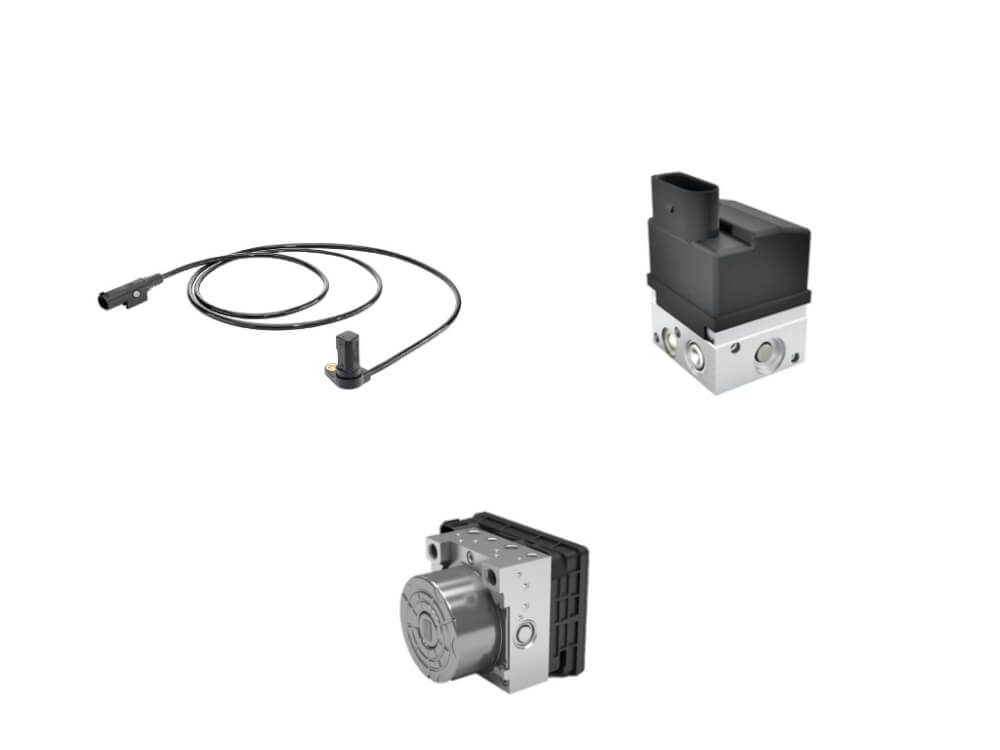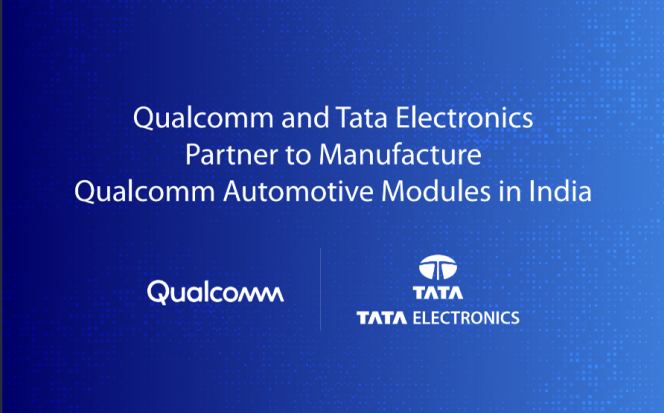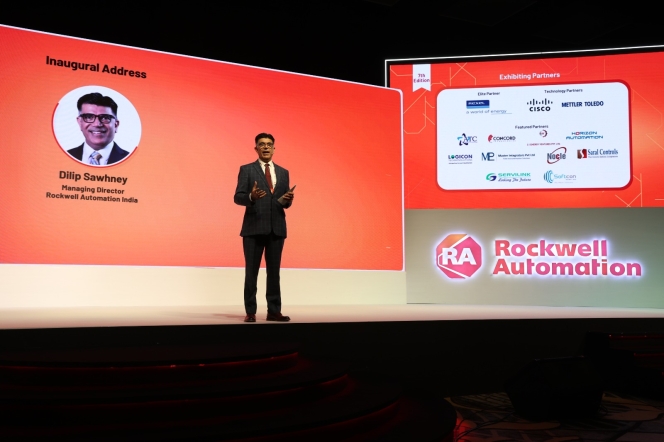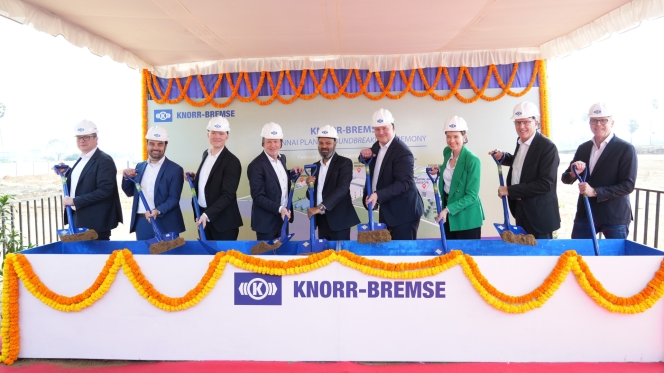- Continental
- Electronic Stability Control
- ESC
- Anti-lock Brake Systems
- ABS
- Wheel Speed Sensors
- WSS
- Vision Zero
- Anudeep Garg
- Sukhdeep Sandhu
Continental’s Gurgaon Plant Attains New Production Milestone for EBS And WSS
- By MT Bureau
- September 13, 2024

German tier 1 supplier Continental’s Gurgaon plant has attained a new production milestone of producing 10 million Electronic Brake Systems (EBS) and 100 million Wheel Speed Sensors (WSS), two components integral to the safety of a vehicle.
The EBS portfolio comprises Electronic Stability Control (ESC) for passenger cars and Anti-lock Brake Systems (ABS) for both, passenger cars and two-wheelers. It provides directional stability and steerability of the vehicle whereas, ABS aims to avoid locking of the wheels and keeps the vehicle steerable during braking. Additionally, the signals from the WSS are required for control systems like Anti-lock Braking System (ABS) and Electronic Stability Control (ESC).
The company states that over 1.3 million people loose their lives in road accidents worldwide every year and more than 50 million are injured. In India, 53 accidents and 19 deaths occur every hour, or an average of 1,264 accidents and 42 deaths daily due to road crashes, according to a Ministry of Road Transport and Highways report in 2023. To enhance road safety in the country, ABS technology was made mandatory in 2019, followed by a proposal for ESC in 2022 by the government.
Sukhdeep Sandhu, Head of Safety and Motion, Continental Automotive India said, “Safety is non-negotiable. At Continental, we have consistently brought relevant technologies to the market for our customers, helping make vehicles and thereby our roads safer. Our expertise in active and passive safety systems is a key driver in reducing the number of traffic-related fatalities, injuries, and road accidents”.
“Localisation is at the core of company’s strategy in India. Supported by legislations which have played a huge role in ensuring vehicular safety, we have been able to localise both production and R&D, ensuring greater value to our customers in the market. Customers in India are proactive in their adoption approach towards safety technologies”, he added.
Continental’s ‘Vision Zero’ is focussing on ensuring zero road fatalities, injuries and crashes, through technologies, components and systems and ongoing innovations.
The tier 1 supplier is also one of the largest manufacturers of WSS in India. Apart from catering to leading OEMs in India, these components are also exported to other Asian and European regions.
Anudeep Garg, Head of the Gurgaon plant, Continental Automotive India said, “We are proud to achieve this milestone and continue to focus on localisation. As a Tier 1 supplier, we follow global manufacturing standards and have adopted several advanced technologies to create a digital shopfloor. Additionally, industry 4.0 technologies enable us to not only maintain product quality and enhance efficiency but also to effectively streamline our supply chain. We aim to increase the manufacturing capacity of EBS and WSS in double-digit percentages in the next three years for both passenger vehicles as well two-wheelers.”
Continental’s ‘in the market, for the market’ approach has seen its entire value chain from R&D to design and production being localised. This way Continental is focusing on enabling easy access to safety products by adapting globally proven technologies to suit the local market. Wide-scale production offers economy of scale and ensures cost advantage, thereby contributing to increased democratization of safety features in vehicles across segments in India.
It was in 2016, when Continental set up assembly lines in Gurugram for Antilock Brake Systems (ABS) and Electronic Stability Control (ESC) systems for two-wheelers and passenger cars. In 2018, it commenced production for ABS and ESC Electronic Control Units (ECU) at its Bengaluru plant. In the subsequent year, the company achieved the production milestone of one million ABS and ESC ECUs at its Bengaluru plant, and in 2020, reached a milestone of 50 Million Wheel Speed Sensors (WSS) at its Manesar plant. Additionally, Continental entered into a joint venture with Japanese firm Nisshinbo Holdings in 2022, to localise machining for valve blocks for Electronic Brake Systems (EBS) in India.
DAF Trucks Vlaanderen Marks 60 Years Of Production In Belgium
- By MT Bureau
- February 21, 2026
DAF Trucks Vlaanderen is celebrating 60 years of manufacturing at its facility in the Belgian Kempen region. Established in 1966 to meet demand for truck cabs, the site has expanded into a production hub for both cabs and axles within DAF’s international network.
The facility in Oevel began operations in the first half of 1966 on a 400,000 sqmt site. Axle production was transferred from Eindhoven to Westerlo in 1971. Today, the site employs 2,000 people and works with 1,000 suppliers.
Over the past decade, DAF has invested more than EUR 650 million in the Westerlo plant. These funds supported the introduction of the XD, XF, XG and XG+ truck generations, as well as their electric variants. The facility was named ‘Factory of the Future’ by the Belgian technology federation Agoria in 2024.
Key infrastructure developments include:
- Cab Paint Shop: A facility nearly 150 metres long utilising robots to apply 3,000 colours while reducing emissions by 50 percent.
- Body Department: A section featuring 145 robots for fully automated production of body-in-white cabs.
- Axle Factory: Automated lines designed to increase output and optimise working conditions.
DAF Vlaanderen operates on a 'just-in-time' principle, delivering components to assembly plants in Eindhoven and Leyland, Great Britain, based on customer orders. In 2021, the facility produced its 3 millionth axle, and it is scheduled to manufacture its 1.5 millionth cab this year.
Jos Habets, member of the DAF Board of Management responsible for Production, stated, “Sixty years of production in Belgium is a tribute to the generations of employees who have built DAF in Westerlo into what it is today: an ultramodern, future-focused production site. And, of course, it is also a fantastic recognition for our 2,000 employees and 1,000 suppliers, including around 400 in Belgium. Thanks to their dedication and commitment, we are able to build trucks that lead the industry in terms of reliability, comfort, and quality. With our ongoing investments in DAF Trucks Vlaanderen N.V., our Belgian factory has a bright future ahead.”
- Qualcomm
- Tata Electronics
- OSAT
- Nakul Duggal
- Dr Randhir Thakur
- Savi Soin
- semiconductor
- SoC
- Snapdragon
Qualcomm And Tata Electronics To Manufacture Automotive Modules In India
- By MT Bureau
- February 20, 2026

Qualcomm Technologies and Tata Electronics have announced a partnership to manufacture Qualcomm Automotive Modules in India. Tata Electronics will join Qualcomm’s network of manufacturing partners to address demand for modular platforms in the automotive sector.
Production is scheduled to take place at Tata Electronics’ Outsourced Semiconductor Assembly and Test (OSAT) facility in Jagiroad, Assam. This facility, built with an investment of USD 3 billion, is the first indigenous site of its kind in India.
The collaboration focuses on the production of modules for digital cockpits, infotainment, connectivity and vehicle systems. Qualcomm Automotive Modules combine Snapdragon Digital Chassis system-on-chips (SoCs) with system components into a single unit. These modules are intended to simplify vehicle design and support the transition to software-defined vehicles.
The Assam facility will utilise several platform technologies, including:
- Wire Bond: For electrical connections between chips and leadframes.
- Flip Chip: To enable high-density connections for performance.
- Integrated Systems Packaging (ISP): For combining multiple components into a single package.
The partnership is intended to diversify the global semiconductor supply chain and support the ‘Make in India’ initiative. By establishing local manufacturing, the companies aim to provide automakers in India and international markets with greater supply chain flexibility.
Nakul Duggal, EVP and Group GM, Automotive, Industrial and Embedded IoT, and Robotics, Qualcomm Technologies, said, “Our work with Tata Electronics marks an important milestone in our automotive growth strategy. As the industry accelerates its shift toward integrated, module-based architectures, expanding manufacturing capacity in key regions becomes essential. Tata Electronics brings worldclass expertise, trusted production capabilities, and a shared commitment to strengthen India’s role in the global semiconductor and automotive ecosystems. Together, we will support automakers with scalable, high-performance solutions built in India.”
Dr Randhir Thakur, CEO & MD, Tata Electronics, added, “We are excited to partner with Qualcomm Technologies to manufacture their advanced automotive modules in India. This collaboration supports Tata Electronics’ objective to become a global hub for high‑technology manufacturing as a trusted partner to our leading semiconductor and automotive customers worldwide. We will leverage our Integrated Systems Packaging (ISP) solutions and deliver high quality, high-performance products to support Qualcomm Technologies’ global product leadership.”
Savi Soin, Senior Vice-President & President, Qualcomm India, added, “Modules are central to Qualcomm Technologies’ vision for the future of vehicle electronics. By providing comprehensive, ready-to-integrate solutions, we help automakers reduce design complexity and bring next-generation vehicles to market more quickly. Manufacturing in India through Tata Electronics enhances our ability to support both Indian and global OEMs with greater flexibility and supply chain resilience.”
Rockwell Automation Concludes 7th Edition Of India Inc On The Move Event
- By MT Bureau
- February 19, 2026

Rockwell Automation, Inc. has concluded the seventh edition of India Inc On The Move (IIOTM) in Mumbai. The event brought together industry leaders and technology innovators to discuss the impact of artificial intelligence (AI), digitalisation and sustainability on Indian manufacturing.
The conference, themed 'The Future Is Here: Smart. Sustainable. AI-Driven Manufacturing', addressed how technology can accelerate transitions in sectors including semiconductors, electronics, automotive, life sciences and food & beverage. These developments are intended to support the manufacturing sector’s role in the Viksit Bharat 2047 initiative.
IIOTM 2026 recorded over 1,200 attendees and included 30 sessions with 70 speakers. The event featured an expo floor with 30 booths displaying interactive technology solutions.
Key areas of discussion included:
- Autonomous Operations: Utilising AI to manage manufacturing processes.
- Software-Defined Manufacturing: Transitioning hardware control to software-based systems.
- Intelligent Sustainability: Implementing digitalisation to track and reduce environmental impact.
- Sector Focus: Strategies for semiconductors, life sciences and automotive industries.
Dilip Sawhney, Managing Director, Rockwell Automation India, said, “IIOTM stands as a catalyst for transformative thinking, bringing leaders together to envision how artificial intelligence can redefine modern manufacturing, unlock new possibilities at scale, and shape a resilient, sustainable industrial future for India.”
“India stands at a pivotal moment, where artificial intelligence, digitalisation and sustainability are converging to redefine industrial competitiveness. The next era of ‘smart’ manufacturing will be shaped by autonomous, software‑defined operations. For the industrial world, however, AI must rise to a higher purpose – being deterministic, explainable, and fully auditable,” added Sawhney.
Knorr-Bremse’s Begins Construction Of EUR 200 Million Chennai Future Campus
- By MT Bureau
- February 15, 2026

German component manufacturer Knorr-Bremse has initiated the construction of a modular campus in Chennai, India, with an investment plan of up to EUR 200 million over the next five years. The facility will integrate engineering, production and artificial intelligence (AI) activities.
Scheduled to commence operations in late 2027, the site will support both the Rail and Truck divisions. The campus is designed to accommodate up to 3,500 employees and will complement existing sites in Pune and Palwal.
The 188,000 square metre facility will be developed in phases. The initial stage includes production plants for metro and high-speed train entrance systems, alongside braking components for commercial vehicles. Later phases, extending to 2030, will add office complexes to house global business services, including finance and HR functions.
Products manufactured at the Chennai hub are intended for the Indian domestic market and global exports. Knorr-Bremse is currently a supplier for rail projects in Delhi and Chennai and is providing braking and sanitation systems for India’s high-speed rail network.
The company selected Chennai due to its infrastructure and engineering landscape. The new campus is located near the Knorr-Bremse AI centre established in 2025. This proximity is intended to accelerate digital projects and improve process efficiency.
Marc Llistosella, CEO, Knorr-Bremse, said, “India is a key region for us with great potential – as a location for innovation, a production hub, and a transport market. Our future campus enables us to connect global capabilities even more closely, make processes more efficient, and accelerate projects. This creates a strong foundation for our Rail and Truck divisions to grow profitably – in India as well as in international markets. The campus is an important building block in our global strategy and a clear commitment to Knorr-Bremse’s long-term growth path.”






Comments (0)
ADD COMMENT